|
|
|
Sort Order |
|
|
|
Items / Page
|
|
|
|
|
|
|
| Srl | Item |
| 1 |
ID:
149483
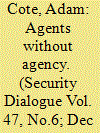

|
|
|
|
|
| Summary/Abstract |
This article assesses the role of the audience in securitization theory. The main argument is that in order to accurately capture the role of the securitization audience, it must be theorized as an active agent, capable of having a meaningful effect on the intersubjective construction of security values. Through a meta-synthesis of 32 empirical studies of securitization, this article focuses on two central questions: (1) Who is the audience? (2) How does the audience engage in the construction of security? When assessed against the theoretical works on securitization, this analysis reveals that the manner in which the audience is defined and characterized within securitization theory differs with the empirical literature that investigates securitization processes. Where the empirical literature suggests securitization is a highly intersubjective process involving active audiences, securitization theory characterizes audiences as agents without agency, thereby marginalizing the theory’s intersubjective nature. This article sketches a new characterization of the securitization audience and outlines a framework for securitizing actor–audience interaction that better accounts for securitization theory’s linguistic and intersubjective character, addresses this theoretical/empirical conflict, and improves our understanding of how groups select and justify security priorities and costly security policies.
|
|
|
|
|
|
|
|
|
|
|
|
|
|
|
|
| 2 |
ID:
149479
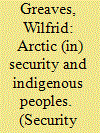

|
|
|
|
|
| Summary/Abstract |
While international relations has increasingly begun to recognize the political salience of Indigenous peoples, the related field of security studies has not significantly incorporated Indigenous peoples either theoretically or empirically. This article helps to address this gap by comparing two Arctic Indigenous peoples – Inuit in Canada and Sámi in Norway – as ‘securitizing actors’ within their respective states. It examines how organizations representing Inuit and Sámi each articulate the meaning of security in the circumpolar Arctic region. It finds that Inuit representatives have framed environmental and social challenges as security issues, identifying a conception of Arctic security that emphasizes environmental protection, preservation of cultural identity, and maintenance of Indigenous political autonomy. While there are some similarities between the two, Sámi generally do not employ securitizing language to discuss environmental and social issues, rarely characterizing them as existential issues threatening their survival or wellbeing.
|
|
|
|
|
|
|
|
|
|
|
|
|
|
|
|
| 3 |
ID:
148329
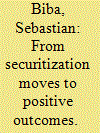

|
|
|
|
|
| Summary/Abstract |
Full securitization has largely been regarded as something negative that should be avoided. While acknowledging this, the present article adds that securitization moves that fail to succeed (i.e. that end in securitization failure) can, at least in the environmental sector of security, trigger positive outcomes if a given issue becomes (re)politicized rather than depoliticized. This is because securitization moves can be helpful in raising sufficient awareness of an issue to gain the attention of the relevant audience(s). Subsequently, the article argues, different audience strategies determine whether securitization moves are turned into securitization failure as (re)politicization or securitization failure as depoliticization. The article introduces different behavioral strategies that audiences can employ to reject securitization moves: the passive recipient strategy, the blocking strategy, and the active reshaping strategy. Only the latter indicates that an audience not interested in letting securitization moves succeed simultaneously seeks to have the issue in question be, or remain, a part of the political agenda. The article uses the spring 2010 Mekong crisis as a test case to support its theoretical arguments.
|
|
|
|
|
|
|
|
|
|
|
|
|
|
|
|
| 4 |
ID:
148328


|
|
|
|
|
| Summary/Abstract |
Embracing the spirit of his observation that ‘what was ruled out beforehand as inconceivable is taking place’, this article urges a re-engagement with Ulrich Beck’s work within security studies. In so doing, the article falls into three parts. First, we provide necessary contextual orientation, discussing the magnitude of Beck’s contribution to understandings of risk and security in the social sciences. Second, we discuss the importance of comprehending Beck’s unique methodological approach in order to appreciate the more specific resonances of his work. Third, we endorse the theoretical novelty of Beck’s work, demonstrating the ways in which the tools that he devised might be put to use and extended in future. To this end, we focus on three interconnected conceptual devices developed by Beck in the latter stages of his career: nichtwissen, emancipatory catastrophism and metamorphosis. We conclude by emphasizing the vital need to grasp the practical as well as the academic ambitions that underpinned Beck’s projective style of social theory.
|
|
|
|
|
|
|
|
|
|
|
|
|
|
|
|
| 5 |
ID:
148326
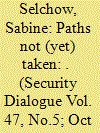

|
|
|
|
|
| Summary/Abstract |
While it is Ulrich Beck’s concept of ‘risk society’ that has mostly attracted attention in the field of security studies, in this article I argue that if we want to take Beck seriously, we need to go beyond his ‘risk society’ thesis and acknowledge that his main thesis was that we live in a social reality that is qualitatively new and, consequently, calls for a radical shift in how we look at and talk about it. To bring Beck into security studies, then, means to study ‘security’ from within Beck’s ‘new world’. For that, I argue, a sharper conception of what characterizes that world is needed. At the heart of my article I provide such a conception – the ‘cosmopolitized world’ – which I identify as being shaped by non-linearity and the interplay of two moments: the ‘cosmopolitized reality’ and the ‘tradition of the national perspective’. Building on this concept and experimenting with it, I turn to reading the ‘US national security’ discourse as this is constructed in the text of the 2015 National Security Strategy from within this ‘cosmopolitized world’. Reflecting on this experiment, I conclude by highlighting the potential that bringing Beck in this way into security studies holds, as well as pointing to the need for future work on the vocabulary of the ‘cosmopolitized world’.
|
|
|
|
|
|
|
|
|
|
|
|
|
|
|
|
| 6 |
ID:
149482
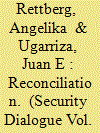

|
|
|
|
|
| Summary/Abstract |
There appears to be a rift between the theoretical and normative understandings of what reconciliation means and offers, and what people expect to happen in postconflict scenarios. Here we present a conceptual framework that captures the definitional diversity surrounding the concept of reconciliation and then operationalizes it in order to analyze responses from postconflict populations. The illustrative application of our framework to responses from a representative survey of 1,843 Colombian citizens reveals that people’s convictions are just as diverse as scholars’. Nevertheless, significant proportions of respondents seem to understand reconciliation to be primarily a psychological and political process which aims to achieve the re-establishment of quotidian or day-to-day relations and cooperation; which should be preceded by the cessation of violence, dialogue, goodwill, and attitudinal and emotional change; and which should be accompanied by social welfare and security. It is noteworthy that understandings of reconciliation as a process mediated by justice, truth, and memory are scarce. The application of this framework will help to reveal differences between hopes and promises, and inform scholarly work and policymaking that is more realistically rooted.
|
|
|
|
|
|
|
|
|
|
|
|
|
|
|
|
| 7 |
ID:
148327


|
|
|
|
|
| Summary/Abstract |
‘Non-knowledge’ is a classical sociological term introduced into sociology most prominently by Georg Simmel. Dismissing classical sociological concepts as ‘zombie categories’, Ulrich Beck turned to non-knowledge relatively late in his career. This article argues provocatively that many of Beck’s observations on issues ranging from the uninsurability of modern risks to the notion of risk itself would have greatly profited from being complemented or even substituted by a theory of not knowing. Viewed in this light, Beck’s notion of risk no longer applies to the world he describes and thus has become one of his own zombie categories. The article then takes up some of Beck’s unfinished attempts at conceptualizing the unknown and develops them further so that they might prove useful for security studies and related fields today. To illustrate this approach, the article uses examples of non-knowledge on matters ranging from potential terrorist attacks to issues of human health and security.
|
|
|
|
|
|
|
|
|
|
|
|
|
|
|
|
| 8 |
ID:
149481


|
|
|
|
|
| Summary/Abstract |
This article challenges the well-established presentation within conflict studies of paramilitary organizations as state-manipulated death squads or self-defence groups, and argues that some present-day militias extend their functions well beyond the role of shadowy pro-regime enforcers. Drawing its empirical insights from Ukrainian pro-government volunteer battalions and supporting its findings with empirical observations from other parts of the world, the article posits that the rise of powerful militia organizations acting in parallel with the state makes it imperative to revisit the theory and typology of paramilitary violence. The key theoretical argument of the article is that ‘state-parallel’ militias differ qualitatively from the ‘state-manipulated’ paramilitaries that are typical of the Cold War period. The article shows that although ‘state-parallel’ paramilitaries are not a new phenomenon, they have thus far remained critically understudied and undertheorized.
|
|
|
|
|
|
|
|
|
|
|
|
|
|
|
|
| 9 |
ID:
149480
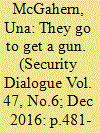

|
|
|
|
|
| Summary/Abstract |
This article examines rumour as a distinct type of speech act and makes a case for engaging with the spaces within which rumours are deployed and circulated in practice. Critiquing the rigid linguistic focus on speech acts within prevailing securitization theories, it follows insights from the fields of political geography and anthropology in order to incorporate voices from the margins more fully into its analysis of threat construction. Examining the local deployment and circulation of rumours in religiously mixed Arab localities in Israel, it argues that the perlocutionary force of rumour not only is rooted in local security and policing arrangements but reveals a spatialization of violence that is particular to the margins. In so doing, the article seeks to contribute to a broadening of the research agenda on the social construction of threat that would not only bring ‘security have-nots’ to the centre of its analysis but draw attention to the margins as a particular type of security space.
|
|
|
|
|
|
|
|
|
|
|
|
|
|
|
|
| 10 |
ID:
148330


|
|
|
|
|
| Summary/Abstract |
This article argues that since 2005, the global security discourse has confused maritime piracy off the Horn of Africa with terrorism. US and European policymakers and financiers have tapped a vulnerable public imaginary to exaggerate Somali pirates as ‘maritime terrorists’ linked to Al-Shabaab and Al-Qaeda, driving the militarization and legal obfuscation of counter-piracy operations. And while Somali piracy has all but disappeared since 2013, international naval coalitions remain deployed in the Indian Ocean, which is still declared a war risk area. The discursive conflation of piracy and terrorism has thereby launched a tactical War on Piracy that mirrors the War on Terror. While pirates were active, this approach pushed them to become more daring and dangerous in response. Drawing on interviews with piracy stakeholders in Kenya, the article concludes that the tactical extension from counter-terrorism to counter-piracy is unresponsive to the origins, motives, and realities of Somali pirates. The article proposes a shift from military to developmental responses to countering and preventing piracy, with an emphasis on respecting local institutions of law enforcement and governance in Somalia.
|
|
|
|
|
|
|
|
|
|
|
|
|
|
|
|
|
|
|
|
|